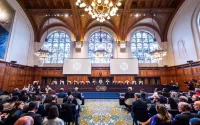14 July 2005Media TransparencyBill Berkowitz
Mainstream U.S. environmental groups, stymied by political defeats, public indifference and budget cuts, are weighing alliances with neo-conservatives. In the struggle to rein in global warming and reduce US dependence on Middle East oil, some greens are reconsidering their longstanding opposition to nuclear power.
This realignment comes at a time when environmental-friendly initiatives of the administration of former President Bill Clinton are being reversed, enforcement of environmental regulations are being slowed and stymied, and privatization of U.S. public lands is proceeding at a rapid clip.
At the same time, the administration of President George W. Bush has seized the initiative in the environmental debate with such Frank Luntz-like slogans as ''common sense environmentalism,” ''Healthy Forests'' and ''Clear Skies'' initiatives to describe its key positions and programs.
Neoconservatives, Environmentalists and Oil
Earlier this year, Robert Bryce, the author of ''Cronies: Oil, the Bushes, and the Rise of Texas, America's Superstate,'' reporting in the online publication Slate, observed that there was a developing alliance between greens and neo-conservatives. Former Central Intelligence Agency (CIA) chief James Woolsey and Frank Gaffney, president of the ultra-right Center for Security Policy (website) -- two big time advocates for President Bush's war with Iraq -- are enthusiastically advocating fuel-efficient vehicles as a way of reducing dependence on Middle East oil.
Bryce pointed out that Woolsey was driving a Toyota Prius -- an early entry in the hybrid-auto market. Gaffney, a frequent defender of Bush’s foreign policy initiatives on television’s cable news networks talking-head fests and a regular contributor to the Rev. Sun Myung Moon’s Unification Church-owned Washington Times, Bryce noted, had “been speaking regularly in Washington about fuel efficiency and plant-based bio-fuels” (“As Green as a Neocon: Why Iraq hawks are driving Priuses")
The coupling of such top neo-conservatives -- the architects of the Iraq war -- with environmentalists -- many of whom have voiced profound concerns about the devastating effects the war has had on the Iraqi environment -- materialized sometime late last year when they backed a proposal from the Institute for the Analysis of Global Security (IAGS) (website), a Washington-based think tank tracking energy and security issues.
The IAGS document, entitled, “Blueprint for Energy Security: ‘Set America Free,” was signed by such neoconservative heavyweights as Woolsey, who is the co-Chairman of the Committee on the Present Danger (website), Gaffney, Gal Luft and Anne Korin of the IAGS, Milton Copulos of the National Defense Council Foundation (website), Bill Holmberg of the American Council on Renewable Energy (website), Robert McFarlane, a former National Security Council Director and Iran/Contra protagonist, Meyrav Wurmser of the Hudson Institute (website), and Cliff May of the Foundation for Defense of Democracies.
The “Blueprint” “spell[ed] out practical ways in which real progress on ‘fuel choice’ can be made over the next four years and beyond.”
“The IAGS plan proposes that the federal government invest $12 billion to: encourage auto makers to build more efficient cars and consumers to buy them; develop industrial facilities to produce plant-based fuels like ethanol; and promote fuel cells for commercial use. The IAGS plan is keen on ‘plug-in hybrid vehicles,’ which use internal combustion engines in conjunction with electric motors that are powered by batteries charged by current from standard electric outlets,” (See the "Blueprint")In a related development in late-March, the Energy Future Coalition (website), a group made up of conservative energy and national security experts, sent a letter to President Bush calling for a change in energy strategy that would take into account conservation and alternative energy sources.
Commenting on why he signed on to the letter Robert McFarlane told the San Francisco Chronicle that, “The implications [of continuing to rely on foreign oil supplies] are truly catastrophic. The good news is the solution to getting off oil is at hand.”
Woolsey, who also signed the letter, somewhat indelicately pointed out that “Middle East turmoil could bring regimes to power that don’t want to sell oil to the rest of the world because they want to live in the seventh century.” In addition, Frank Gaffney, who helped organize the letter, is concerned about China, as is often his bent: “The Chinese are on the march trying to secure access to oil and choke points. This could be part of a medium-to long-term strategy to confront us or go to war with us.” (In June, the China National Offshore Oil Corporation (CNOOC) announced an $18.5-billion bid for Unocal Corp., the California-based oil giant, the ninth-biggest oil company in the US.)
For neoconservatives, it is all about reducing “the flow of American dollars to oil-rich Islamic theocracies, Saudi Arabia in particular,” Bryce wrote. The neo-cons are ''going green for geopolitical reasons, not environmental ones,'' he concluded.
The Sierra Club’s global warming program director, Dan Becker, sees the neoconservatives as unexpected but welcome allies. Becker told the San Francisco Chronicle that, “These conservatives recognize our oil dependency causes major problems for the United States...They’ll hit Congress from the right, and we’ll see if Congress finally gets it.”
Business Week recently reported that well-known security hawks and neoconservatives such as McFarland, Gaffney, and Woolsey “have joined together with conservative Christian leader Gary Bauer and the environmental group Natural Resources Defense Council (NRDC) to form a new coalition called Set America Free (website) to lobby for greater national energy independence.”
According to the San Francisco Chronicle’s Edward Epstein, the US depends of imported oil for 60 percent of consumption, “a figure expected to rise to two-thirds of consumption by 2020.” Americans currently consume 21 million barrels of oil a day, which, writes Epstein, “will climb to 26 million barrels or more a day in 2020.”
Reviving Nuclear Power
On April 19, a New York Times editorial pointed out that the House was moving forward “toward approval of yet another energy bill heavily weighted in favor of the oil, gas and coal industries.” Unless President Bush “rapidly elevates the discussion, any bill that emerges from Congress is almost certain to fall short of the creative strategies needed to confront the two great energy-related issues of the age: the country's increasing dependency on imported oil, and global warming, which is caused chiefly by the very fuels the bill so generously subsidizes.”
On June 28, the Senate approved the energy bill by an overwhelming 85-12 vote. According to North Dakota’s Argus Leader, there are a slew of differences between the Senate and House versions: “The Senate bill will cost $18 billion, the House only $8 billion. The Senate included $14.1 billion in tax incentives for renewable energy development, the House $8.1 billion in incentives for natural gas and petroleum. The Senate wants 20 percent of the country's electricity to come from renewable resources by 2020 (wind power, for instance), and the House has no similar provision at all. The Senate wants an 8 billion gallon Renewable Fuels Standard (ethanol), while the House wants only 5 billion.” A House-Senate conference committee is slated to hammer out the details.
There are 103 operational nuclear reactors in the US. After the 1979 partial meltdown of Three Mile Island in Pennsylvania, followed by the 1986 explosion at the Chernobyl plant in the Ukraine, interest in developing new nuclear plants virtually disappeared. According to The Economist, “In Japan, Tokyo Electric Power, the world's largest private electricity company, shut its 17 nuclear reactors after it was caught falsifying safety records to hide cracks at some of its plants in 2002.”
The attacks on 9/11 appeared to seal the deal on nuclear power as they “were a sharp reminder that the risks of nuclear power generation were not only those inherent in the technology,” The Economist pointed out.
Now, however, all that appears to be changing. TVO, a Finnish consortium, recently began work “on the first new nuclear plant to be built on either side of the Atlantic in a decade,” The Economist reported. Pertti Simola, TVO's chief executive, told the weekly news magazine that, “Finland has opened the door to a new nuclear era! Many western countries will come behind us.”
In France, the parliament recently gave “its approval for a new nuclear plant” to be built by Areva, the world's largest nuclear supplier. Areva’s Guillaume Dureau said that the company is “pretty convinced of a nuclear revival and [we] need to prepare for it. We need to hire 1,000 engineers.”
In the US, the Senate’s version of the Energy Bill is loaded with 'significant financial incentives for the development of new nuclear technologies, including a subsidy for new reactors and loan guarantees for their construction. The House's version does not include those packages.
In late June, President Bush, a strong supporter of the nuclear industry, became “the first president to visit a nuclear plant in 26 years when he recently stopped by a Maryland plant,” The Charlotte Observer recently reported.
"There is a growing consensus that more nuclear power will lead to a cleaner, safer nation," Bush said at the Calvert Cliffs Nuclear Power Plant, according to Bloomberg News. "It is time for this country to start building nuclear power plants again."
''As the world approaches peak oil and a future of rapidly escalating energy costs, increasing support for nuclear power amongst some environmentalists was predictable,'' Scott Silver, executive director of the Oregon-based grassroots environmental group Wild Wilderness, said in a recent interview.
''The unwritten mission of many organizations is 'sustainable growth' which translates into supporting economic growth while minimizing associated ecological damage,'' Silver said. ''In keeping with this mission, the fight against global warming will not be waged by attempting to decrease the ecological footprint of man or by reducing the demands we put upon this planet, but by growth.”
Several leading environmentalists, including Fred Krupp, executive director of Environmental Defense, Jonathan Lash, president of the World Resources Institute, and James Gustave Speth, dean of Yale University's school of forestry and environmental studies, are encouraging research into the economic, safety and security, waste storage, and proliferation issues surrounding nuclear power.
In a piece published in the journal, Technology Review, entitled ''Environmental Heresies,'' Stewart Brand, the longtime environmentalist who founded the ''Whole Earth Catalogue -- a comprehensive directory/consumer guide to the goods and services needed to forge an alternative lifestyle -- argued that perhaps the only solution to global warming, a reality the Bush administration has not openly embraced, is nuclear power.
''By tightly framing the issue in terms of 'too much carbon dioxide', nuclear power becomes an obvious solution,'' Silver pointed out. ''For industry and the neo-cons, the problem has nothing to do with climate. For the neo-cons, the problem is one of sustaining economic growth during a period of energy scarcity.''






